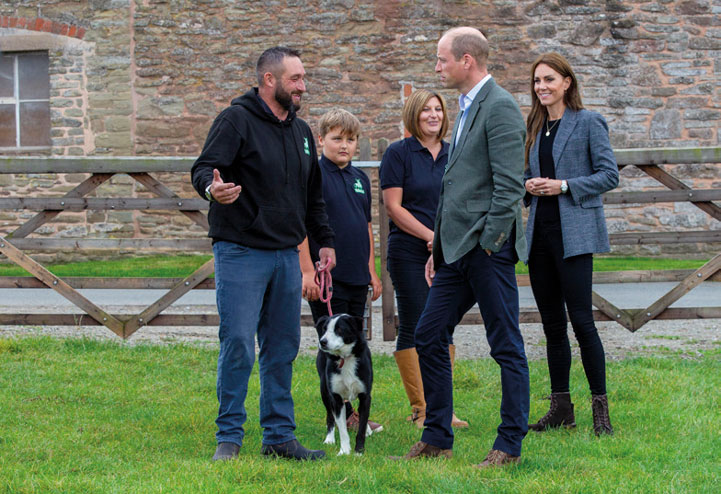Social wellbeing plays a vital role in the community
The current pressures from the agricultural transition and the cost of living along with continued regulation, price volatility and weather extremes bring significant personal and business challenges to the farming sector. Rural communities are impacted by factors such as isolation, poverty and the availability of jobs and homes. According to the internationally recognised Warwick-Edinburgh Mental Wellbeing Scale, the farming community has a lower average mental wellbeing than the UK population.
The ultimate goal of a society is a combination of human flourishing, happiness and wellbeing – the concept of 'eudaimonia'
Aristotle, 2,500 years ago
But evidence from Scottish Land & Estates (SLE) has proved that rural estates can be major contributors to improving wellbeing and consequently mental health in rural areas. One of the most important and direct ways they can contribute is by providing homes for people to live in. Affordable local housing, both for rent and private sale, are a crucial way for rural estates to improve social value.
Social entrepreneurship
While rural communities have to manage multiple challenges they also have a long history of self-reliance and social entrepreneurship that connects people at a local level. Support is growing, with an increasing number of local and national charities offering mental health support specifically to the farming sector. These include YANA – Rural Mental Health Support, the mental health charity MIND, The DJP Foundation in Wales, The Royal Agricultural Benevolent Institution (RABI), The RSABI in Scotland and The Addington Fund.
Further good news is the Higher Education Statistics Agency reports that enrolments into agricultural-based higher education courses have risen by 17% since 2020 and that there has been a 44% increase in female students over the last five years. An influx of a more diverse and younger demographic into agriculture will hopefully bring inspiration and innovation to boost the sector.
The economics of wellbeing
The Scottish government has a vision to establish a wellbeing economy, which means an economic system that serves and prioritises the collective wellbeing of current and future generations. Two key factors link wellbeing to economic performance: social inequality and environmental sustainability. The causal links between inequality and sub-optimal economic performance are well established. Research by the Organisation for Economic Co-operation and Development has shown that UK GDP is already at least 9% lower than it should be because of rising inequality.
In 2022, SLE wanted to assess how rural estates contribute to the development of a wellbeing economy, so together with BIGGAR Economics, they quantified how our rural estates are vital in sustaining rural communities and in driving local economic development through agriculture, forestry, tourism, recreation and renewable energy generation.
The report concluded that rural estates make a substantial contribution to building a wellbeing economy in Scotland. The largest contribution is to natural capital, principally due to the role estates play in protecting, enhancing and providing access to the environment. However, it conclusively confirmed that estates are vital in sustaining rural communities and driving local economic activity.
Indirect or direct exposure to nature, having a view of nature and spending time outside in natural settings, are linked to improvements in physical, mental and social wellbeing
ONS, 2022
In England, the Country Land and Business Association (CLA) has commissioned a project to explore the social benefits that landowners provide for their communities. Partnered by the Countryside and Community Research Institute (CCRI), the project aims to quantify the social value delivered by the CLA’s members. A comprehensive survey of its 26,000 members together with workshops will provide data that the CCRI can analyse for its report, due to be published this spring.
Economists have only recently started to understand the vital role that social value plays in supporting economic performance. Mounting evidence shows social value can explain the differences in economic performance and where skills levels are relatively low (as they are in many rural areas) high levels of social value can compensate to some degree as a stimulus for economic growth.
In conclusion, BIGGAR Economics found clear evidence that rural estates make a substantial contribution to the prosperity of the rural economy. Rural land provides jobs and generates wealth in areas where alternative opportunities are scarce. Rural estates also play a key role in helping rural communities thrive. The provision of homes for people to live in and land for rural enterprise, alongside the engagement of communities in decision-making, are all key elements in creating social value.
CASE STUDY THE DUCHY OF CORNWALL

Their Royal Highnesses The Prince and Princess of Wales with Sam and Emily Stables, founders of We Are Farming Minds © Charlie Sainsbury-Plaice, Duchy of Cornwall
The first private landlord to launch a specific mental health strategy is The Duchy of Cornwall, who, alongside HRH The Prince of Wales, are focused on the mental health, wellbeing and resilience of their farmers and wider rural communities. The Duchy is aiming to destigmatise mental health within the agricultural sector and become a leading provider of mental health support to its tenants. The Duchy has partnered with the Royal Agricultural Benevolent Institution, The Farming Community Network and We Are Farming Minds, a charity co-founded by two of its tenants. The Duchy has committed to a three-year programme working with the charities to provide tenants with support and has developed a three-phased approach for its mental health strategy:
- Every tenant across the Duchy estate has been provided with access to a wellbeing support service along with a fridge magnet with the details of how to access this. In addition, the farming tenants have been linked with the three farming help charities that have been provided with funding from the Duchy to allow them to support tenants in times of need.
- To combat loneliness within its farming communities, The Duchy is running a series of pasty and pint nights and other social occasions to bring people together, without an agenda.
- Reinforcement of the importance of mental health, wellbeing and resilience, provision of support and giving everyone the ability to talk is being made by The Duchy on every occasion to ensure that the message is heard loud and clear.
Although still in the early days of the strategy, The Duchy has already seen the effect, with mention of the fridge magnets being made by its most isolated tenants. The Duchy will monitor progress every six months and review how it is supporting its tenants. While financial investment has been made into launching the strategy, The Duchy considers it a drop in the ocean compared to the importance of the wellbeing of its tenants.
Read the articles within Spotlight: Social value in a rural context below.
.jpg)

